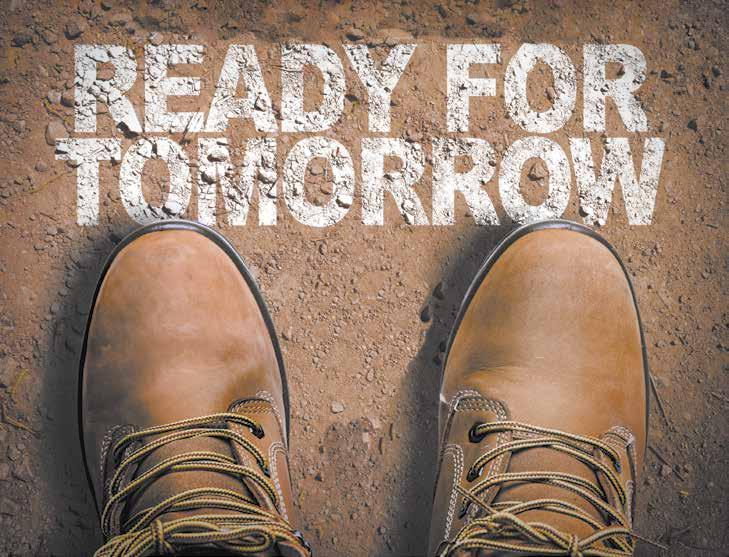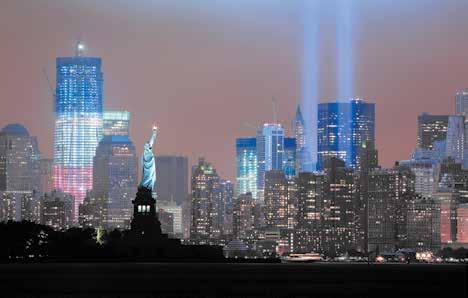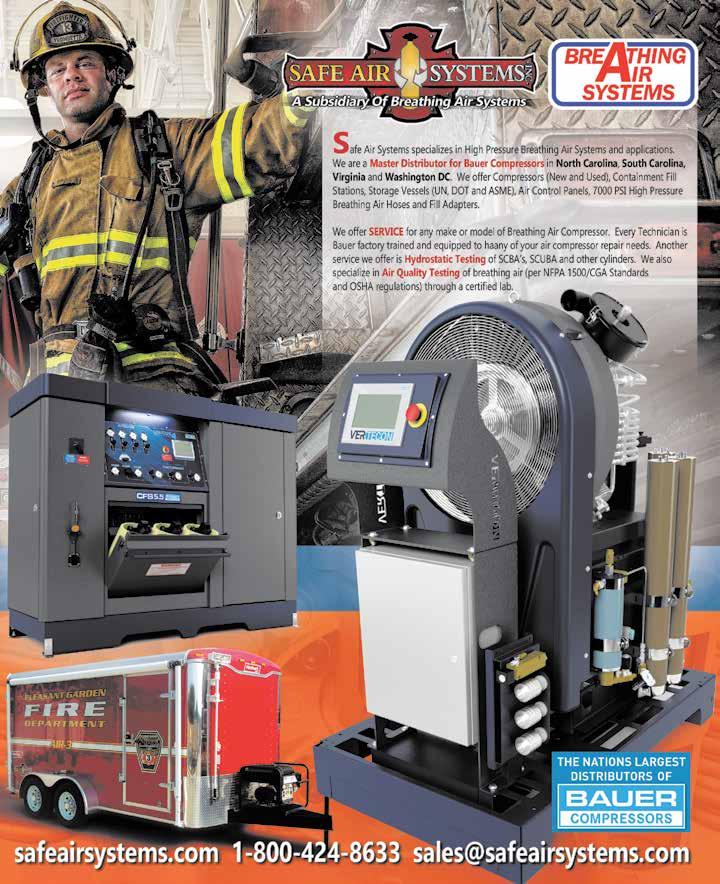
7 minute read
September 11 — 20 Years Later
There’s a storm brewing. Unfortunately, I am not referring to a tropical cyclone or the development of a Dr. David Greene line of supercells. I am referring to an incident that is vile. One that is incomprehensible. One that will have a tremendous loss of life and will claim the lives of firefighters.
You are reading this after the 20year anniversary of the terrorist attacks on September 11, 2011. However, I am typing this before the anniversary date. It is human nature to lose memories as time goes on. Add to that the fact, that we are now hiring firefighters who were born after the September 11th attacks occurred, and it is easy to understand how it is harder to remember. The lack of a major terrorist attack over the last 20 years has lulled us into a false sense of security.
Advertisement
Let me remind you. On September 11, 2001, two commercial airliners hit the World Trade Center in New York City. Another hit the Pentagon in Washington, DC and a fourth crashed in Shanksville, PA while passengers fought terrorists for control of the plane. In New York City, a radio transmission was recorded early in the incident from the field communications unit to the FDNY communications center. “George, have them mobilize the Army. We need the Army in Manhattan.” How many of us have been the Incident Commander at a call where we have considered needing the Army to successfully prosecute the incident. Try to imagine that.
In response to 9/11, many of us focused our training on specialized types of responses. My department sent firefighters to radiological training in Nevada, nerve agent training in Alabama, initial response to terrorist bombing training in New Mexico, and hazardous materials life support training in Arizona, just to name a few. However, that was years ago. Although it is possible that our brewing storm will evolve in the form of one of these incidents, it is also possible, and perhaps more likely, that our “storm” incident will involve a simpler means of attack. It could be an active shooter incident, a truck that strikes multiple people, or even a knife attack. From the perspective of someone who wants to cause us harm, firearms and knives are much easier to acquire than radiological sources and nerve agents. This is not to say that we do not need to prepare for a nerve agent attack, but we should also prepare for mass casualty incidents caused by means that are easier to employ. Moreover, we should prepare for a combination of attacks. Shortly after 9/11, we were warned that a plan was discovered to use crop dusters with organophosphates laced with radium. The results of such an attack would yield a group of individuals showing signs of nerve agent exposure, as a result of the organophosphate. It would be a secondary thought to pull the radiation detectors off the hazmat truck, to identify the presence of radium.
It is not enough that we train for and consider what our brewing storm will look like. We also need something else. There are countless reports of what the FDNY firefighters faced when they arrived at the World Trade Center. Although 343 FDNY firefighters made the ultimate sacrifice that day, there were countless others that survived, despite thinking that they were going to die as well. Fighting such a welldeveloped fire so high above the ground with the structural damage that had occurred was not something any of them had experienced. In one instance, an engine crew shook hands, acknowledged the honor it was to serve alongside each other, and said goodbye. They then proceeded into one of the towers to help rescue civilians and all of them believed they would perish while doing so. This is the “something else” that we will need. Courage. We need courage not just to prosecute the incident when it occurs, but we need courage to stand up against the nay-sayers. Make no mistake, we will have people that wonder why we need to purchase a nerve agent detector. We will have people wonder why we have to buy a ballistic vest for every firefighter. We will have firefighters wondering why we are “wasting our time” training on nerve agents or radiological sources. We must have the courage to remind any doubters, that we must not forget why the training and equipment is important.
Why is it important? Several years ago, I was fortunate enough to visit the 9/11 memorial in New York City. I anticipated an emotional experience having watched the incident unfold

— Abraham Lincoln
that day in September 2001. To say I was unprepared is an understatement. Before going inside the memorial, my family and I took time to observe the silence at the reflecting pools in front of the memorial. The walls of these pools are etched with the 2,983 people who were killed in the 2001 and 1993 World Trade Center attacks. We observed a man with a clipboard placing flowers in some of the etched names. There was no pattern to his flower placement and as he approached us, I asked, “Excuse me sir, what is the significance of the flowers you are placing?” The man replied softly, “The flowers are placed on anyone that has a birthday today.” I couldn’t speak to even say thank you. It set the stage for a very powerful visit inside the memorial. The deaths that the memorial honors have ripple effects well into a second generation today.
It is not just important that we remember 9/11 to honor those killed. It is equally as important that we remember 9/11 so that we are prepared for the future. Think for a minute of how many of our citizens rise and sleep without thinking about us. That is to say, that very few, if any, of our citizens lay down at night and think, “I’m going to sleep well because I know that if my house catches on fire in the middle of the night, or I have a heart attack or stroke, there is a group of people in a fire station somewhere that will come save me.” Many of our citizens do not think about us until they are actually experiencing the worst day of their lives. We cannot afford that mindset.
The more time that passes, the harder it will be to remember how painful that day in September was. For our new people born after it happened, they have no frame of reference. It is incumbent upon us to remain prepared. We must train. We must equip. WE MUST NEVER FORGET! In the words of Abraham Lincoln, “It is altogether fitting and proper that we should do this.”
Take time today to remember. Remember the 343 FDNY firefighters who died in the line of duty on September 11, 2001. Remember the almost 3,000 civilians that died that day. Remember that there is a storm coming and it is our responsibility to be ready to respond to it and prepare the generations of firefighters behind us to be prepared for it. Prior to 9/11, no one could have imagined an incident with such a loss of life. Fires in 110 story buildings that cause both buildings to collapse in two hours was incomprehensible. We, those of us watching on television, were just as surprised as the brave FDNY personnel operating at the scene when the towers collapsed so quickly. It was inconceivable. Today, we must consider the inconceivable, the incomprehensible and the unbelievable. That is how we will properly prepare for the storm brewing. We must train for the incomprehensible. We must communicate with our neighboring agencies, who will be tasked with assisting us should the storm strike our jurisdiction. Finally, we must never forget.
Never forget their sacrifice, their courage, and never forget that fateful day in September of 2001.
Be safe and do good.
Dr. David A. Greene has over 30 years of experience in the fire service and is currently the deputy chief with Colleton County (S.C.) Fire-Rescue. He holds a PhD in Fire and Emergency Management Administration from Oklahoma State University and an MBA degree from the University of South Carolina. He is a certified Executive Fire Officer through the National Fire Academy, holds the Chief Fire Officer Designation from the Center for Public Safety Excellence, holds Member Grade in the Institution of Fire Engineers, is an adjunct instructor for the South Carolina Fire Academy and is a Nationally Registered Paramedic. He can be reached at dagreene@lowcountry.com.












